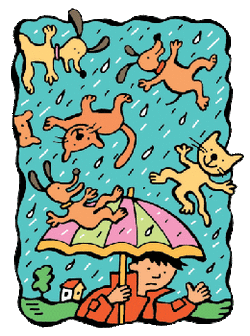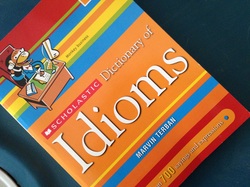

For someone like me, who grew up speaking English and only English, I take for granted the ease of the English language, but, for some people, English isn't that easy. A study was conducted by a language processing company called Idibon to try and determine not which languages are "hard" to learn (Arabic is in the top five), but, which languages are "weird". The Idibon study looked into which languages used the greatest number of unusual features that are not used in many other languages. I am proud (?) to report that English ranked number 33 out of 239 languages in the "weirdness index". I can't decide if that is a good number or bad? I guess the fact that our language made the "weirdness list" should ease the minds of the non-native speakers. Now when they make grammatical, phonetical and pronunciation faux pas, they can acknowledge that they are not in fact weird, but, it is the English language who is to blame.


A perfect example happened on one of the 72 snow days we had this winter (it sure felt like 72 snow days). It was one of those days where it was icy and the roads were hazardous just in time for the morning commute and the weather men predicted a worse scenario than what actually occurred. By noon, the snow and ice had melted and the sun was shining. As Ryan and I headed out to the grocery store he said, "I can't believe we didn't have school today." "Tell me about it.", I replied. Without missing a beat Ryan said, "I just did tell you about it. Didn't you hear me? Maybe you are going deaf." Yes, literally, Ryan did just "tell me about it", but, figuratively, he wasn't going to "tell me about it" again. I smiled the entire way to the grocery store, but, still wondered how much weird English language Ryan misses in social conversations. It makes perfect sense that Ryan chooses to stay quiet, to avoid social settings when the words he is trying to understand are so freaking weird.




When I hear my friend speaking Hindi, which is "all Greek to me", I recognize that getting Ryan to speak in idioms or metaphors is like asking him to speak a foreign language and that I'm "barking up the wrong tree", so I have stopped "beating a dead horse" and put the Dictionary of Idioms away. Ryan may not memorize idioms, metaphors and slang, in order to enhance his pragmatic speech, but, as with so many things in the world of autism, I have learned, that there is "more than one way to skin a cat" so, even though Ryan may be a "tough nut to crack", I keep in mind that "Rome was not built in a day" and when it comes to helping my son succeed, I will never, ever "throw in the towel".



 RSS Feed
RSS Feed
